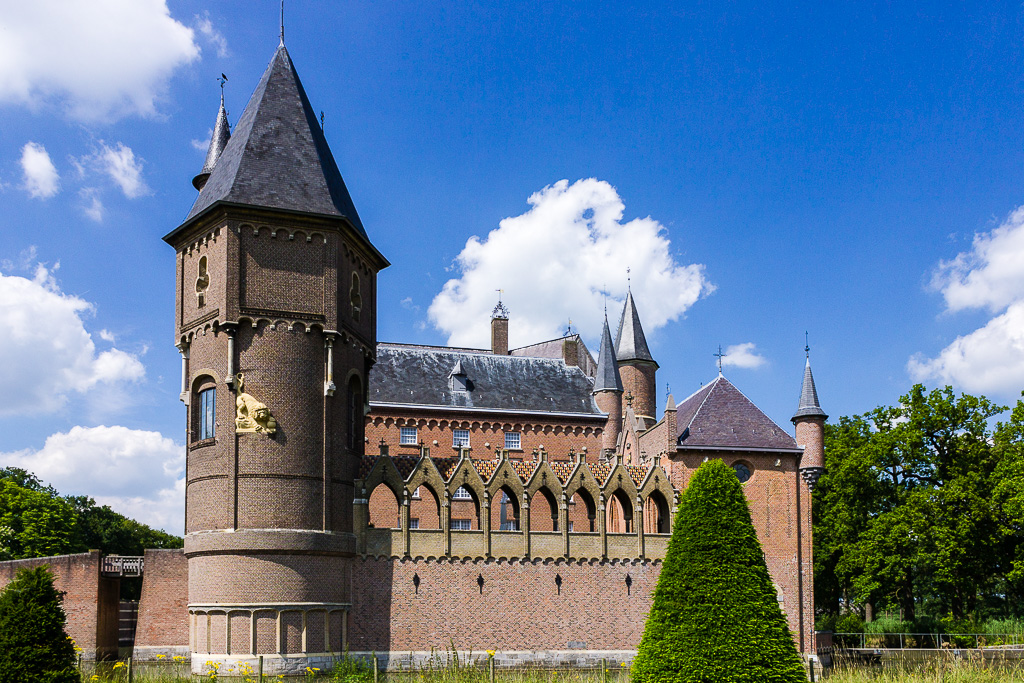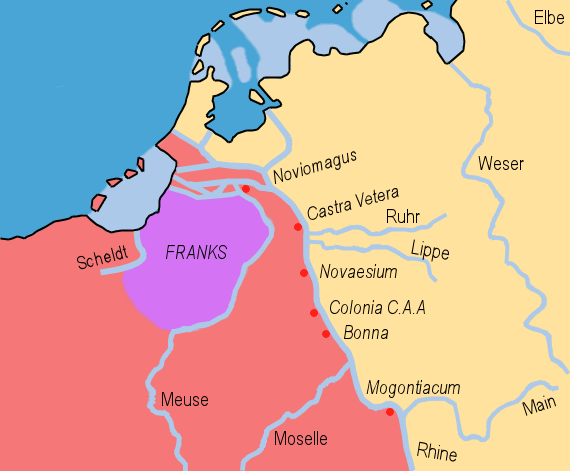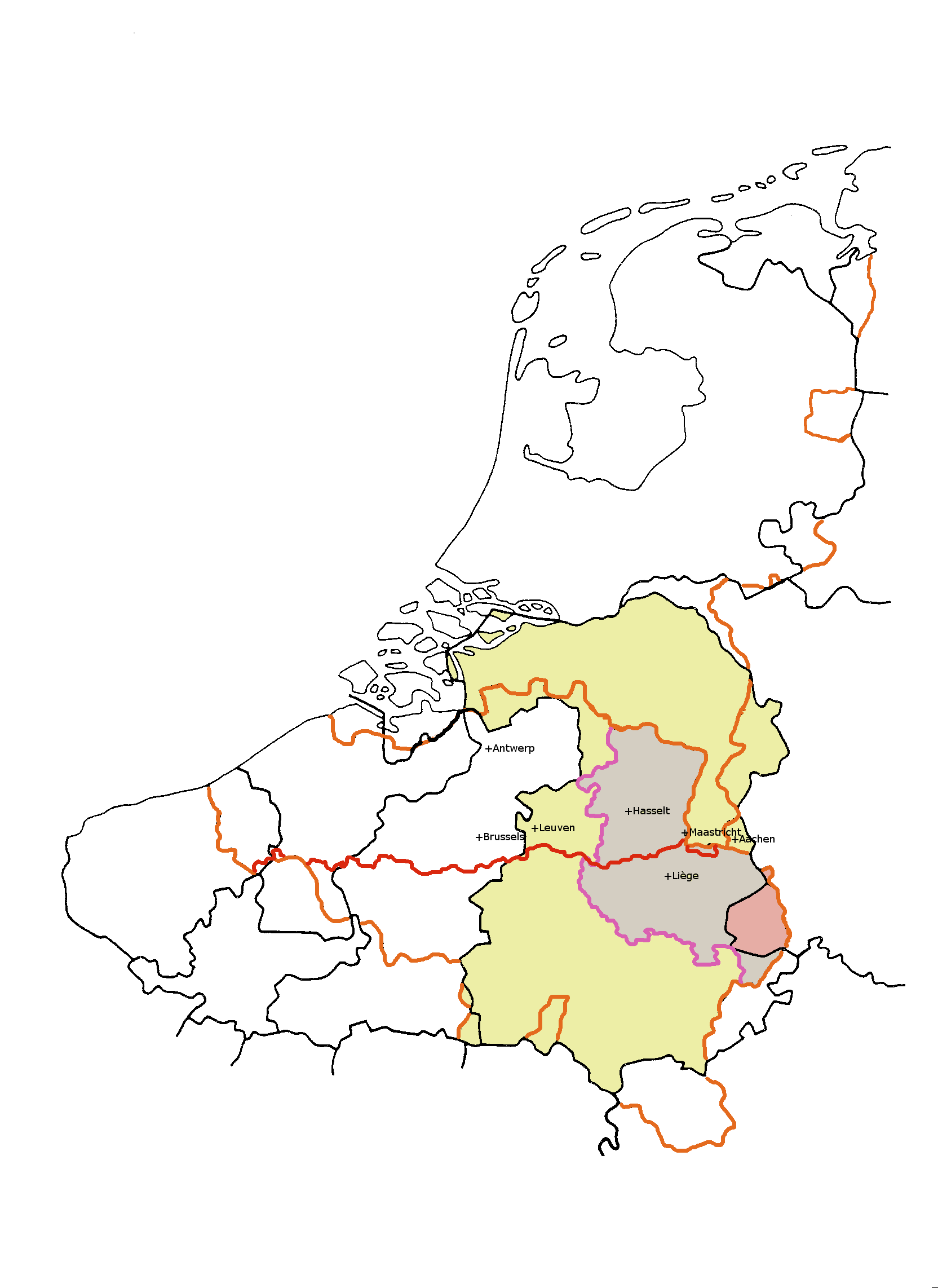|
Toxandrians
The Texandri (also Texuandri; later Toxandri, Toxiandri, Taxandri) were a Germanic people living between the Scheldt and Rhine rivers in the 1st century AD. They are associated with a region mentioned in the late 4th century as Texandria (also Toxiandria; later Toxandria, Taxandria), a name which survived into the 8th–12th centuries. Name Attestations The only inscription that convincingly mentions the name is dated 100–225 AD and gives the form ''Texand(ri)''. It was found on an altar in Brocolitia (Carrowburgh Fort) near Hadrian's Wall. A more uncertain inscription from Romania dated 102/103 AD reads ''Texu'', and they are also mentioned as ''Texuandri'' by Pliny (1st c. AD), which may suggest that the two forms ''Texuandri'' and ''Texandri'' co-existed already in the late-1st and 2nd centuries AD. The variant form ''Toxiandria'' is only attested once in a 9th-century manuscript of Ammianus Marcellinus' ''Res Gestae'' (ca. 390) to designate the region. The form ''Taxan ... [...More Info...] [...Related Items...] OR: [Wikipedia] [Google] [Baidu] |
Eburones
The Eburones (Greek: ) were a Gallic- Germanic tribe dwelling in the northeast of Gaul, in what is now the southern Netherlands, eastern Belgium and the German Rhineland, in the period immediately preceding the Roman conquest of the region. Though living in Gaul, they were also described as being both Belgae and Germani (for a discussion of these terms, see below). The Eburones played a major role in Julius Caesar's account of his "Gallic Wars", as the most important tribe within the ''Germani cisrhenani'' group of tribes — ''Germani'' living west of the Rhine amongst the Belgae. Caesar claimed that the name of the Eburones was wiped out after their failed revolt against his forces during the Gallic Wars, and that the tribe was largely annihilated. Whether any significant part of the population lived on in the area as Tungri, the tribal name found here later, is uncertain but considered likely. Name Attestations They are mentioned as ''Eburones'' by Caesar (mid-1st c. ... [...More Info...] [...Related Items...] OR: [Wikipedia] [Google] [Baidu] |
Gaulish Language
Gaulish was an ancient Celtic language spoken in parts of Continental Europe before and during the period of the Roman Empire. In the narrow sense, Gaulish was the language of the Celts of Gaul (now France, Luxembourg, Belgium, most of Switzerland, Northern Italy, as well as the parts of the Netherlands and Germany on the west bank of the Rhine). In a wider sense, it also comprises varieties of Celtic that were spoken across much of central Europe (" Noric"), parts of the Balkans, and Anatolia (" Galatian"), which are thought to have been closely related. The more divergent Lepontic of Northern Italy has also sometimes been subsumed under Gaulish. Together with Lepontic and the Celtiberian spoken in the Iberian Peninsula, Gaulish helps form the geographic group of Continental Celtic languages. The precise linguistic relationships among them, as well as between them and the modern Insular Celtic languages, are uncertain and a matter of ongoing debate because of their sparse at ... [...More Info...] [...Related Items...] OR: [Wikipedia] [Google] [Baidu] |
Dommel
The Dommel is a small river in Belgium and the Netherlands, left tributary of the Dieze. It is 120 km long, of which 85 km in the Netherlands. The Dommel takes in water from the Keersop, Tongelreep, Run, Gender and Kleine Dommel streams and merges at 's-Hertogenbosch with the Aa stream to form the river Dieze, which subsequently flows towards the Meuse. The main cities and towns along the Dommel's course are Peer, Neerpelt, Valkenswaard, Dommelen, Eindhoven, Son en Breugel, Sint-Oedenrode, Boxtel, Sint-Michielsgestel and 's-Hertogenbosch. Drainage basin The drainage basin of the Dommel belongs to that of the Meuse. To the west of is the basin of the Donge, which also belongs to that of the Meuse. To the south the basin of the Dommel borders that of the Schelde. To the east is that of the Aa. Further to the south a number of rivers flow into the Meuse much further upstream. History Former glory The Dommel often looks like a brook nowadays, but it has many geographical ... [...More Info...] [...Related Items...] OR: [Wikipedia] [Google] [Baidu] |
Pagus
In ancient Rome, the Latin word (plural ) was an administrative term designating a rural subdivision of a tribal territory, which included individual farms, villages (), and strongholds () serving as refuges, as well as an early medieval geographical term. From the reign of Diocletian (284–305 AD) onwards, the referred to the smallest administrative unit of a province. These geographical units were used to describe territories in the Merovingian and Carolingian periods, without any political or administrative meaning. Etymology is a native Latin word from a root , a lengthened grade of Indo-European , a verbal root, "fasten" (''pango''); it may be translated in the word as "boundary staked out on the ground". In semantics, used in is a stative verb with an unmarked lexical aspect of state resulting from completed action: "it is having been staked out", converted into a noun by , a type recognizable in English adjectives such as surveyed, defined, noted, etc. English doe ... [...More Info...] [...Related Items...] OR: [Wikipedia] [Google] [Baidu] |
North Brabant
North Brabant ( nl, Noord-Brabant ; Brabantian: ; ), also unofficially called Brabant, is a province in the south of the Netherlands. It borders the provinces of South Holland and Gelderland to the north, Limburg to the east, Zeeland to the west, and the Flemish provinces of Antwerp and Limburg to the south. The northern border follows the Meuse westward to its mouth in the Hollands Diep strait, part of the Rhine–Meuse–Scheldt delta. North Brabant has a population of 2,562,566 as of November 2019. Major cities in North Brabant are Eindhoven (pop. 231,642), Tilburg (pop. 217,259), Breda (pop. 183,873) and its provincial capital 's-Hertogenbosch (pop. 154,205). History The Duchy of Brabant was a state of the Holy Roman Empire established in 1183 or 1190. It developed from the Landgraviate of Brabant and formed the heart of the historic Low Countries, part of the Burgundian Netherlands from 1430 and of the Habsburg Netherlands from 1482, until it was split up after th ... [...More Info...] [...Related Items...] OR: [Wikipedia] [Google] [Baidu] |
Julian (emperor)
Julian ( la, Flavius Claudius Julianus; grc-gre, Ἰουλιανός ; 331 – 26 June 363) was Roman emperor from 361 to 363, as well as a notable philosopher and author in Greek. His rejection of Christianity, and his promotion of Neoplatonic Hellenistic religion, Hellenism in its place, caused him to be remembered as Julian the Apostate in Christian tradition. A nephew of Constantine I, Constantine, Julian was one of few in the imperial family to survive the purges and civil wars during the reign of Constantius II, his cousin. Julian became an orphan as a child after his father was executed in 337, and spent much of his life under Constantius's close supervision.''Oxford Dictionary of Late Antiquity'', "Julian the Apostate", p. 839 However, the emperor allowed Julian to freely pursue an education in the Greek-speaking east, with the result that Julian became unusually cultured for an emperor of his time. In 355, Constantius II summoned Julian to court and appointed him to ru ... [...More Info...] [...Related Items...] OR: [Wikipedia] [Google] [Baidu] |
Salian Franks
The Salian Franks, also called the Salians (Latin: ''Salii''; Greek: Σάλιοι, ''Salioi''), were a northwestern subgroup of the early Franks who appear in the historical record in the fourth and fifth centuries. They lived west of the Lower Rhine in what was then the Roman Empire and today the Netherlands and Belgium. The traditional historiography sees the Salians as one of the main divisions of the Franks alongside the Ribuarians. Recent scholarship, however, has often questioned the ethnic significance of both these terms. Etymology Various etymologies are proposed. The ethnonym is unrelated to the name for the dancing priests of Mars, who were also called Salii. In line with theories that the Salians already existed as a tribe outside the Roman Empire, the name may have derived from the name of the IJssel river, formerly called ''Hisloa'' or ''Hisla'', and in ancient times, ''Sala'', which may be the Salians' original residence. Today this area is called Salland. Al ... [...More Info...] [...Related Items...] OR: [Wikipedia] [Google] [Baidu] |
Henry Thomas Riley
Henry Thomas Riley (June 1816 – 14 April 1878) was an English translator, lexicographer, and antiquary. Life Born in June 1816, he was only son of Henry Riley of Southwark, an ironmonger. He was educated at Chatham House, Ramsgate, and at Charterhouse School (1832–4). He entered Trinity College, Cambridge, but at the end of his first term migrated to Clare College where he was admitted on 17 December 1834, and elected a scholar on 24 January 1835. In 1838 he obtained a Latin essay prize. He graduated B.A. in 1840 and M.A. in 1859, after which he moved to Corpus Christi College. On 16 June 1870 he was incorporated at Exeter College, Oxford. Riley was called to the bar at the Inner Temple on 23 November 1847, but early in life he began hack work for booksellers to make a living, by editing and translation. On the creation of the Historical Manuscripts Commission (by royal charter in April 1869), Riley was engaged as an additional inspector for England, and given the task of e ... [...More Info...] [...Related Items...] OR: [Wikipedia] [Google] [Baidu] |
John Bostock (physician)
John Bostock, Jr. FRS (baptised 29 June 1773, died 6 August 1846) was an English physician, scientist and geologist from Liverpool. Life Bostock was a son of Dr. John Bostock, Sr. He spent some time at New College at Hackney where he attended Joseph Priestley's lectures on chemistry and natural philosophy, before graduating in Medicine at the University of Edinburgh and practising medicine in Liverpool. He moved to London in 1817 where he concentrated on general science. In 1819, Bostock was first to accurately describe hay fever as a disease that affected the upper respiratory tract. He lectured on chemistry at Guy's Hospital and was President of the Geological Society of London in 1826 when that body was granted a Royal Charter and Vice President of the Royal Society in 1832. Bostock died of cholera in 1846; He is buried in the Kensal Green Cemetery, London. Works Bostock was one of the first chemical pathologists. He was the first to realise the relationship between the di ... [...More Info...] [...Related Items...] OR: [Wikipedia] [Google] [Baidu] |
Loeb Classical Library
The Loeb Classical Library (LCL; named after James Loeb; , ) is a series of books originally published by Heinemann in London, but is currently published by Harvard University Press. The library contains important works of ancient Greek and Latin literature designed to make the text accessible to the broadest possible audience by presenting the original Greek or Latin text on each left-hand page, and a fairly literal translation on the facing page. The General Editor is Jeffrey Henderson, holder of the William Goodwin Aurelio Professorship of Greek Language and Literature at Boston University. History The Loeb Classical Library was conceived and initially funded by the Jewish-German-American banker and philanthropist James Loeb (1867–1933). The first volumes were edited by Thomas Ethelbert Page, W. H. D. Rouse, and Edward Capps, and published by William Heinemann, Ltd. (London) in 1912, already in their distinctive green (for Greek text) and red (for Latin) hardcover bin ... [...More Info...] [...Related Items...] OR: [Wikipedia] [Google] [Baidu] |
Bibliotheca Teubneriana
The Bibliotheca Teubneriana, or ''Bibliotheca Scriptorum Graecorum et Romanorum Teubneriana'', also known as Teubner editions of Greek and Latin texts, comprise one of the most thorough modern collection published of ancient (and some medieval) Greco-Roman literature. The series consists of critical editions by leading scholars. They now always come with a full critical apparatus on each page, although during the nineteenth century there were ''editiones minores'', published either without critical apparatuses or with abbreviated textual appendices, and ''editiones maiores'', published with a full apparatus. Teubneriana is an abbreviation used to denote mainly a single volume of the series (fully: ''editio Teubneriana''), rarely the whole collection; correspondingly, ''Oxoniensis'' is used with reference to the ''Scriptorum Classicorum Bibliotheca Oxoniensis'', mentioned above as ''Oxford Classical Texts''. The only comparable publishing ventures producing authoritative scholarl ... [...More Info...] [...Related Items...] OR: [Wikipedia] [Google] [Baidu] |
Tungri
The Tungri (or Tongri, or Tungrians) were a tribe, or group of tribes, who lived in the Belgic part of Gaul, during the times of the Roman Empire. Within the Roman Empire, their territory was called the ''Civitas Tungrorum''. They were described by Tacitus as being the same people who were first called "''Germani''" ( Germanic), meaning that all other tribes who were later referred to this way, including those in Germania east of the river Rhine, were named after them. More specifically, Tacitus was thereby equating the Tungri with the "''Germani Cisrhenani''" described generations earlier by Julius Caesar. Their name is the source of several place names in Belgium, Germany and the Netherlands, including Tongeren, Tongerlo Abbey, and Tongelre. image:Germanie-inferieure.jpg, 301x301px, The Roman province of Germania Inferior, showing Atuatuca, modern Tongeren, the capital of the Tungri (Tongres). Places associated with the Tungri are in bright green. It was on the road between Amiens ... [...More Info...] [...Related Items...] OR: [Wikipedia] [Google] [Baidu] |






.jpg)
